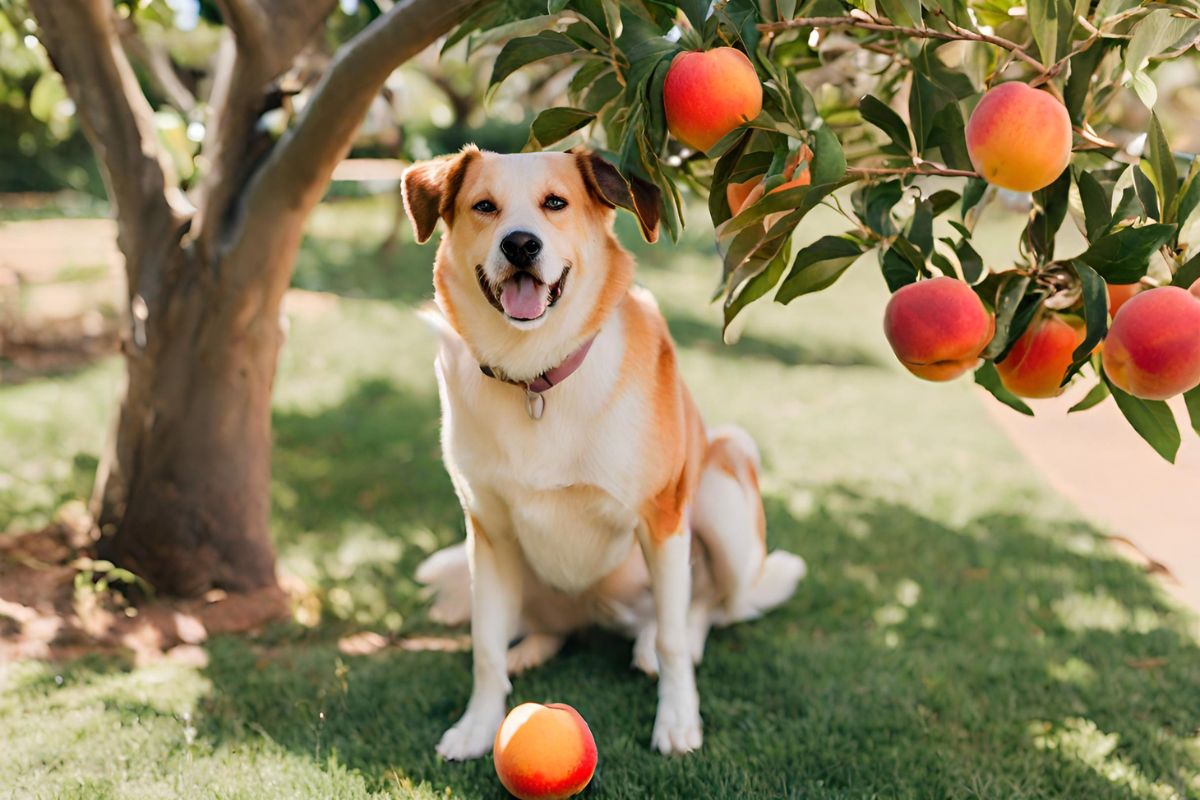Nectarines are a very well-loved fruit, known for their beautiful sunset colors, smooth peel, and sweet, juicy taste. But can dogs eat nectarines? If so, should they eat them? Read on to find out!
Can dogs eat nectarines?
Let’s get right to the point: Yes, your dog can eat nectarines, but you must be sure to remove the pit inside of it first. However, the skin and the flesh of the fruit are safe to give to your dog in small portions. As well as being a tasty sweet treat, they are full of healthy nutrients and can make a great addition to your pup’s diet.
Benefits of eating nectarines for dogs
Nectarines are a great source of vitamin C, vitamin A, and potassium for dogs. Vitamin C is a powerful and essential antioxidant that fights free radicals in the body, which cause aging and damage to the cells. Vitamin A supports healthy eyesight, bones, reproduction, and cellular differentiation, as well as immunity.
Potassium is an important electrolyte that helps the heart with its electrical charges and assists in nerve health and muscular movement. They’re also chock full of other antioxidants and dietary fiber, which contributes to the maintenance of healthy weight and digestion.
Whilst dogs should be getting all of the vitamins and minerals they need from their daily meals, additional nutrients can only benefit your dog.

Are nectarine pits toxic to dogs?
Yes, nectarine pits are poisonous to dogs. They contain trace amounts of cyanide, a highly toxic chemical, but this is unlikely to harm your dog unless consumed in massive quantities or if your dog is very small.
Small amounts of the chemical can also be fatal to dogs with liver disease, so remember to take that into consideration if that applies to you. Symptoms of cyanide poisoning in dogs include:
- Difficulty breathing
- Irregular heartbeat
- Drooling
- Seizures
- Coma
You should take your dog to the emergency vet as soon as possible if they have symptoms of cyanide poisoning, or call the Pet Poison Helpline (at 855-764-7661) if you’re not sure.
Are nectarine pits dangerous to dogs?
The two biggest risks of eating fruit pits for dogs are choking and internal blockages. Signs of choking in dogs include:
- Struggling to breathe
- Gagging
- Panic
- Pawing at the mouth
- Drooling
If your dog starts to choke, you should open their mouth and remove the pit if you can see it. If you can’t, you’ll need to perform the Heimlich maneuver to get it out. Check out the video below to see how.
An internal blockage can happen when a small, tough, or jagged object gets stuck inside the intestines. Signs of this happening in dogs include:
- Vomiting
- Diarrhea or inability to poop
- Lethargy
- Rapid breathing
- Appetite loss
- Thirst & dehydration
- Lip licking
- Bloating
- Pacing
- Intense discomfort & pain
Internal blockages can be lethal and almost always require surgery to remove. Some of these symptoms can also point to other things, but it’s important to get them checked out by a vet as soon as possible.
Can diabetic dogs eat nectarines?
Yes, diabetic dogs can eat nectarines in small quantities as a treat because they have a low glycemic index of 35 and should not cause significant spikes in their blood sugar.
Can overweight dogs eat nectarines?
Dog-safe fruits like nectarines make a good treat for overweight dogs because they’re tasty, healthy snacks, so long as they’re given in appropriate quantities in line with your dog’s diet plan.
Can sensitive dogs eat nectarines?
Whether or not dogs with sensitive stomachs can eat nectarines depends on what triggers their sensitivities, but generally, high-fiber foods like fruits don’t mix well with sensitive pups, so try it in a small quantity and if it upsets your dog’s tummy, avoid it in future.
What happens if my dog eats too much nectarine?
If your dog eats too much nectarine they will likely have an upset tummy for a day or two. If this happens, make sure that you keep them hydrated and feed them plain food. If the upset persists, contact your vet,
Can puppies eat nectarines?
Yes, puppies over 12 weeks of age can eat little bite-sized slices of nectarine as a treat, but not too much, as their developing digestive systems are so sensitive.
Can dogs have frozen nectarines?
If your dog is a fan of the fruit, frozen slices of nectarine (with no added sugar) can be a nice cool treat for dogs in the summertime. However, you should let them soften a little before giving them to your dog if your dog is older or has weak teeth.
Can dogs have dried nectarines?
Dried fruits are not appropriate for dogs because they are concentrated with high-quality sugar and have the liquid removed to dry them, which can make them a bit too chewy for dogs.
Can dogs have nectarine juice?
Nectarine juice has all the same nutrients as nectarines, but it is higher in sugar. So, your dog can have a few licks of nectarine juice here and there, or it can be used in making or baking homemade treats, but it shouldn’t be given to them regularly or in large amounts – and only if it’s not concentrated with added sugars.
Can dogs have nectarine jam?
While nectarine jam is not toxic to dogs, we don’t recommend giving your dog any type of jam. Jams are very high in sugar, which is not healthy for dogs and could damage their health, and teeth, and cause weight gain if consumed regularly over time.
How many nectarines can I give to my dog?
The general rule of thumb is that you can give your dog between one to three small slices of nectarine, depending on how big they are. For very small dogs, one or two slices may be better.
As with any treat, too much fruit can upset your dog’s tummy. Just because it’s healthy, doesn’t mean there’s no limit to how much your dog can have, so take care and trust your gut.
How often can a dog eat nectarines?
If nectarines are a popular fruit in your home, you can give them to your dog as a daily treat, but if you give your dog lots of treats already, sticking to fruit a couple of times a week may be a better idea.
How to prepare nectarine for dogs
As mentioned above, you can’t just give your dog an entire nectarine. It’s too much fruit for your dog’s tummy and it’s a choking hazard because of the pit. It’s best to cut the flesh into small slices for your dog and give it to them in individual slices.
You can also get creative if your dog is a big fan of the fruit. If you ever cook them for yourself for dessert, there’s no reason why your dog can’t have a few spoonfuls, just so long as you’re not adding sugar.
If you’re a fan of nectarine juice, you can also give them a few licks of that, or mix a little with some xylitol-free yogurt and put it in the freezer for some yummy, dog-safe nectarine ice cream.
Can dogs be allergic to nectarines?
Dogs can be allergic to almost anything, just like us. Fruit allergies are pretty rare in dogs but totally possible. Signs to look out for include changes in the way your dog smells or the way their fur feels, as well as being low in energy and having stomach upsets.
If you think your dog could be allergic to nectarines, try giving them a different fruity snack instead. There are plenty to choose from – we will list a few safe options below!
Alternatives to nectarines
If you can’t or don’t want to give your dog nectarines, check out some of these fruity alternatives.
Can dogs eat plums?
The flesh of a plum is perfectly fine for dogs to eat in small slices as a treat, so long as the stem, leaves, and most importantly, pit, are removed first. They are full of nutritious fiber and are chock full of vitamin C and polyphenols, a nutrient that promotes bone health and even reduces the risk of chronic diseases.
Can dogs eat apricots?
Dogs can eat apricots and they’re quite similar to nectarines in taste and texture. They’re also very good for dogs and are even known to improve digestion and lower blood pressure. Just be sure to remove the pit, stem, and leaves, first, as they contain cyanide and they’re a choking hazard.
Can dogs eat peaches?
Peaches are another good alternative to nectarines. They’re a great source of vitamin A and fiber for dogs, but they should be given in small portions, and of course, the pit in the middle must be removed first.
Other dog-safe fruits to try include:
Fruits that are toxic or dangerous to dogs:
- Grapes & raisins
- Boysenberries
- Cherries
- Figs
- Grapefruit
- Lemons
- Limes
- Avacado
Bottom line, Yes, dogs can eat nectarines and they can even be beneficial, so long as they don’t get their paws on too much of it and it is prepared safely!
Does your dog like nectarines? Let us know in the comments below!



